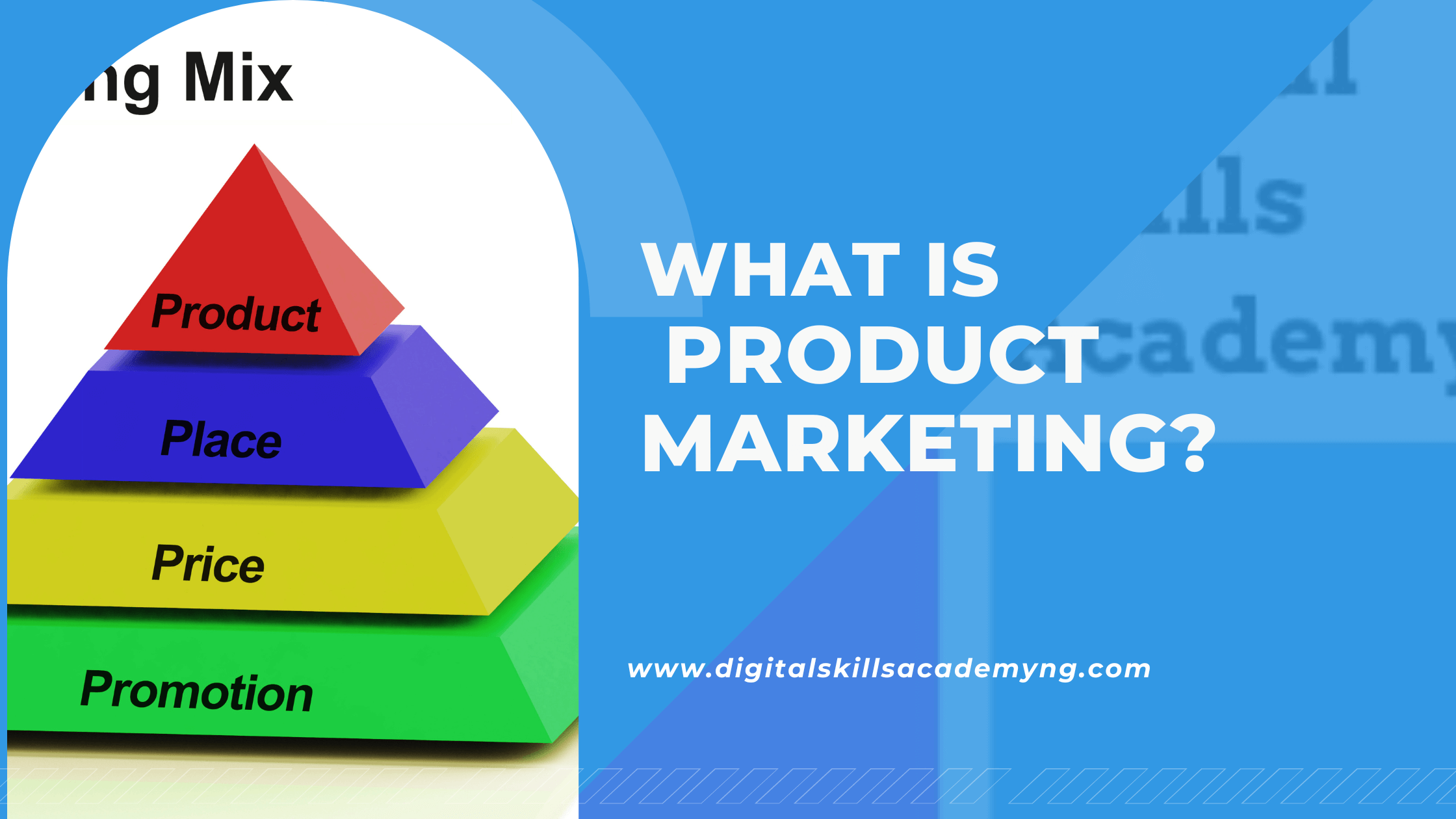Product marketing is an essential function within any company that strives to align product development with customer needs and market demands.
This blog explains the meaning of product marketing, its strategy, real-world examples, relevant courses, and job descriptions and concludes with a thoughtful reflection on the importance of this discipline.
What is Product Marketing
Table of Contents
Product marketing is often considered the bridge between product development and sales. It’s a multifaceted discipline focusing on positioning, messaging, and promotion to ensure a product resonates with the target audience. Unlike general marketing, which might include brand awareness and customer engagement, product marketing focuses on driving demand for a specific product.
Product marketing is the art and science of bringing a product to market, ensuring its success, and maximizing its growth potential. It’s about understanding the customer, the product, and the market landscape to create compelling strategies that drive business growth.
The Meaning of Product Marketing
Product marketing is a strategic function that involves the following key components:
a. Product Positioning
Product positioning identifies the product’s unique value proposition and how it stands out. This involves understanding the target audience’s needs and desires and crafting messaging that resonates with them.
b. Market Research
Understanding the market is crucial in product marketing. This includes analyzing competitors, identifying market trends, and understanding customer behavior. Market research helps make informed decisions about product features, pricing, and marketing strategies.
c. Go-to-Market Strategy
The go-to-market (GTM) strategy is the blueprint for how a product will be launched and promoted. It involves planning the product launch, creating marketing materials, training sales teams, and coordinating with various departments to ensure a successful product introduction.
d. Messaging and Communication
A core responsibility of product marketing is creating clear and compelling messaging that communicates the product’s benefits. This messaging must be consistent across all channels, from advertising to social media, to ensure a cohesive brand image.
e. Sales Enablement
Product marketing also involves working closely with the sales team to provide them with the tools and knowledge they need to sell the product effectively. This includes creating sales collateral, training materials, and competitive analysis reports.
How to Grow a Business with Digital Marketing
Product Marketing Strategy
A well-defined product marketing strategy is essential for any product’s success. Here’s a step-by-step guide to building an effective strategy:
- Understand the Market and Customer
The first step in any product marketing strategy is understanding the market and the customer. This involves conducting market research to identify key trends, customer pain points, and opportunities. Understanding the competitive landscape is also crucial to positioning the product effectively.
- Define the Target Audience
Knowing who the product is for is essential in crafting a strategy that resonates with potential customers. This includes creating detailed buyer personas that outline the target audience’s demographics, behaviors, needs, and preferences.
- Develop a Unique Value Proposition
The unique value proposition (UVP) sets the product apart from competitors. It’s a clear statement that explains the product’s benefits and why it’s the best choice for the target audience. The UVP should be reflected in all marketing efforts, from messaging to advertising.
- Craft a Go-to-Market Plan
The go-to-market plan is the roadmap for launching the product. It includes the launch timeline, marketing channels, promotional activities, and coordination with sales and other departments. A well-executed GTM plan ensures the product reaches the right audience at the right time.
- Create Compelling Messaging and Content
Content is at the heart of any product marketing strategy. This includes creating product descriptions, landing pages, blog posts, social media content, and more. The messaging should be consistent, clear, and aligned with the product’s UVP.
- Enable the Sales Team
Sales enablement gives the sales team the tools and knowledge to sell the product effectively. This includes creating sales decks, training materials, and competitive analysis reports. Regular communication with the sales team ensures they align with the marketing strategy.
- Monitor and Optimize
Once the product is launched, monitoring its performance and adjusting as needed is essential. This includes tracking key metrics such as sales, customer feedback, and market trends. Continuous optimization ensures that the product remains competitive and continues to grow.
Examples of Successful Product Marketing Applications
To better understand product marketing in action, let’s explore some real-world examples:
a. Apple’s iPhone Launch
Apple’s iPhone launch is a textbook example of successful product marketing. Apple positioned the iPhone as a revolutionary device that combined a phone, an iPod, and an internet communicator.
The messaging was clear, the product launch was meticulously planned, and the sales team was well-prepared. The result was a product that disrupted the market and became a cultural icon.
b. Dropbox’s Referral Program
Dropbox’s referral program is another excellent example of product marketing. To grow its user base, Dropbox offered additional storage space to users who referred friends to the service. This strategy leveraged word-of-mouth marketing and created a viral loop that boosted Dropbox’s growth. The referral program was simple, effective, and aligned with Dropbox’s value proposition.
c. Slack’s Product-Led Growth
Slack’s approach to product marketing focused on product-led growth. Instead of relying on traditional marketing channels, Slack concentrates on creating a product that is easy to use and provides immediate value.
The product’s features encouraged adoption and engagement, leading to organic growth through word-of-mouth and user referrals. Slack’s success demonstrates the power of a well-designed product in driving growth.
Product Marketing Courses
For those looking to build a career in product marketing, several courses cover the essential skills and knowledge needed. Here are some top recommendations:
a. Product Marketing Alliance’s Product Marketing Core
The Product Marketing Core course by the Product Marketing Alliance is a comprehensive program that covers all aspects of product marketing. It includes modules on market research, messaging, go-to-market strategy, sales enablement, and more. The course is designed for beginners and experienced professionals looking to enhance their skills.
b. General Assembly’s Product Marketing Course
General Assembly offers a Product Marketing course that provides hands-on product marketing strategy development experience.
The course covers market research, product positioning, and go-to-market planning. It’s ideal for those looking to gain practical skills in product marketing.
c. Coursera’s Product Management and Product Marketing Specialization
Coursera specializes in Product Management and Product Marketing, including courses from top universities such as the University of Virginia and the University of Illinois.
The specialization covers product positioning, pricing strategies, and product launch planning. It’s a great option for those seeking a deep understanding of product marketing.
d. Udemy’s Product Marketing Bootcamp
Udemy’s Product Marketing Bootcamp is a comprehensive course covering product marketing fundamentals. It includes modules on market research, product messaging, sales enablement, and more. The course is designed for beginners and those looking to transition into a product marketing role.
Job Description: What Does a Product Marketer Do?
The role of a product marketer varies depending on the company and industry, but here are some common responsibilities and qualifications:
Key Responsibilities
- Market Research: Conducting market research to understand customer needs, market trends, and competitive landscape.
Product Positioning: Developing and communicating the product’s unique value proposition to the target audience.
- Go-to-Market Strategy: Planning and executing the product launch, including coordinating with sales, marketing, and other departments.
- Sales Enablement: Providing the sales team with the tools and knowledge to sell the product effectively.
- Messaging and Content Creation: Creating compelling messaging and content that resonates with the target audience.
- Performance Monitoring: Tracking key metrics and adjusting the marketing strategy.
Qualifications and Skills of a Product Marketer
- Education: A bachelor’s degree in marketing, business, or a related field is typically required. Some roles may prefer candidates with a master’s degree or relevant certifications.
- Experience: Previous experience in marketing, product management, or a related field is often required. Experience in the industry or market relevant to the product is also beneficial.
- Skills: Strong analytical, communication, and creative skills are essential. Product marketers must be able to think strategically, work collaboratively, and adapt to changing market conditions.
What We Say
Product marketing is a vital function that plays a critical role in the success of any product. It’s the bridge between product development and sales, ensuring that the product resonates with the target audience and achieves its full potential in the market.
By understanding the customer, crafting compelling messaging, and executing a well-planned go-to-market strategy, product marketers can drive growth and create lasting value for their companies.
Whether you’re an aspiring product marketer or a seasoned professional, the skills and knowledge required for this role are in high demand. Investing in product marketing courses and staying up-to-date with industry trends can help you stay ahead of the competition and succeed in this dynamic field.
In conclusion, product marketing is not just about selling a product; it’s about creating a connection between the product and the customer. It’s about understanding the customer’s needs, communicating the product’s value, and ensuring it delivers its promise. With the right strategy and execution, product marketing can turn a good product into a great one and drive lasting success for any company.




